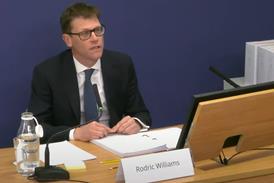Despite the Law Society's warning that criminal duty solicitors are on their way to becoming extinct, the government today confirmed that its broader review into criminal legal aid fees will not be ready until late 2020.
Responding to the House of Commons justice select committee's report on criminal legal aid, the Ministry of Justice said it will share 'emerging findings' with the profession throughout the review process, which begins this month. A final report, including recommendations, will be published towards the end of the summer next year.
However, the ministry said: 'It is important to highlight that the ability to deliver against these dates would be dependent on the legal professions working with us to gather, build, provide and share qualitative and quantitative evidence, which must go far beyond the billing data we currently use.'
The review will begin with a 'scoping phase' to determine the review's scope and remit. The ministry said it is 'mindful' of broader changes across the justice sector, including modernisation work being carried out by the Home Office, police, Crown Prosecution Service and HM Courts & Tribunals Service.
The ministry agreed with the committee's recommendation that the review should include consideration of remuneration for dealing with unused material. It will also take part in a Criminal Justice Board working group 'to take forward' the attorney general's recommendation, in his disclosure review, to consider whether changing the timing of legal aid payments would facilitate earlier and more effective engagement with defence practitioners.
Law Society president Christina Blacklaws said: 'We welcome the review of criminal legal aid fees and we hope this exercise is accompanied by a commitment to increase spending on criminal legal aid. Reporting on a fundamental rethink in 2020 is all very well, but we are facing a crisis today. Twenty years without any increases in fees, and a series of drastic cuts has meant there are not enough young lawyers entering the field of criminal defence work.
'The absolute minimum that is required immediately is for the government to ensure the position stops getting any worse, by implementing an immediate cost of living increase in all remuneration rates, and committing to do so every year. It is also essential that the review includes an independent analysis of what is required to ensure the market is economically sustainable. Means testing thresholds should similarly be uprated.'
No mention is made within the government's response of its post-implentation review of the Legal Aid, Sentencing and Punishment of Offenders Act 2012, which was supposed to be published last month and is due any day now. On Tuesday shadow justice minister Gloria De Piero MP asked in a written question when the LASPO review will be published. She said she has yet to receive a response.

















![David Lester (senior partner at Blythe Liggins), Darryl Barnes, Jagdeep Sandher (head of dispute resolution at Blythe Liggins)[4]](https://d1d8vslyhr7rdg.cloudfront.net/Pictures/274x183/4/2/8/116428_davidlesterseniorpartneratblytheligginsdarrylbarnesjagdeepsandherheadofdisputeresolutionatblytheliggins4_981603_crop.jpg)






11 Readers' comments